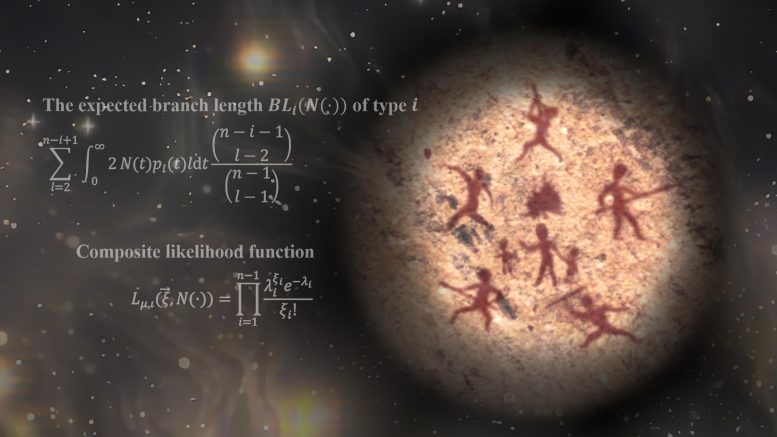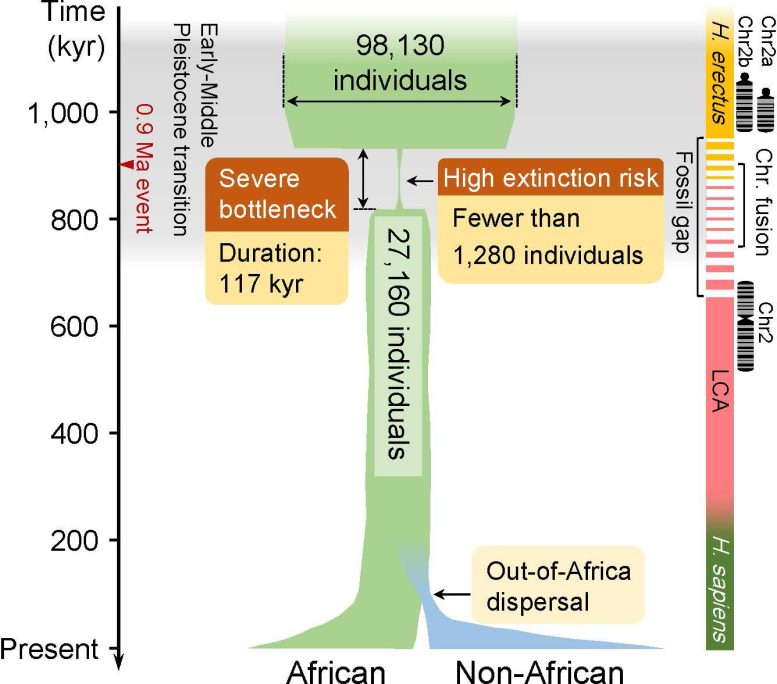
A new method of inferring ancient population size has revealed a severe bottleneck in the human population which almost wiped out the chance for humanity as we know it today.
An unexplained gap in the African/Eurasian fossil record may now be explained thanks to a team of researchers from China, Italy, and the United States. Using a novel method called FitCoal (fast infinitesimal time coalescent process), the researchers were able to accurately determine demographic inferences by using modern-day human genomic sequences from 3,154 individuals. These findings indicate that early human ancestors went through a prolonged, severe bottleneck in which approximately 1,280 breeding individuals were able to sustain a population for about 117,000 years. While this research has illuminated some aspects of early to middle Pleistocene ancestors, there are many more questions to be answered since uncovering this information.
The FitCoal Methodology
A large volume of genomic sequences were analyzed in this study. However, “the fact that FitCoal can detect the ancient severe bottleneck with even a few sequences represents a breakthrough,” says senior author Yun-Xin Fu, a theoretical population geneticist at the University of Texas Health Science Center at Houston.
Researchers will publish their findings online in Science on August 31, 2023 (America Eastern Standard Time). The results determined using FitCoal to calculate the likelihood for present-day genome sequences found that early human ancestors experienced extreme loss of life and therefore, loss of genetic diversity.

Interpreting the Fossil Gap
“The gap in the African and Eurasian fossil records can be explained by this bottleneck in the Early Stone Age as chronologically. It coincides with this proposed time period of significant loss of fossil evidence,” says senior author Giorgio Manzi, an anthropologist at Sapienza University of Rome. Reasons suggested for this downturn in the human ancestral population are mostly climatic: glaciation events around this time lead to changes in temperatures, severe droughts, and loss of other species, potentially used as food sources for ancestral humans.
Genetic Diversity and Human Evolution
The repercussions of this bottleneck are staggering. An estimated 65.85% of current genetic diversity may have been lost due to this bottleneck in the early to middle Pleistocene era, and the prolonged period of minimal numbers of breeding individuals threatened humanity as we know it today. However, this bottleneck seems to have contributed to a speciation event where two ancestral chromosomes may have converged to form what is currently known as chromosome 2 in modern humans. With this information, the last common ancestor has potentially been uncovered for the Denisovans, Neanderthals, and modern humans (Homo sapiens).
Unearthing New Questions
We all know that once a question is answered, more questions arise.
“The novel finding opens a new field in human evolution because it evokes many questions, such as the places where these individuals lived, how they overcame the catastrophic climate changes, and whether natural selection during the bottleneck has accelerated the evolution of the human brain,” says senior author Yi-Hsuan Pan, an evolutionary and functional genomics at East China Normal University (ECNU).
Now that there is reason to believe an ancestral struggle occurred between 930,000 and 813,000 years ago, researchers can continue digging to find answers to these questions and reveal how such a small population persisted in assumably tricky and dangerous conditions. The control of fire, as well as the climate shifting to be more hospitable for human life, could have contributed to a later rapid population increase around 813,000 years ago.
“These findings are just the start. Future goals with this knowledge aim to paint a more complete picture of human evolution during this Early to Middle Pleistocene transition period, which will, in turn, continue to unravel the mystery that is early human ancestry and evolution,” says senior author LI Haipeng, a theoretical population geneticist and computational biologist at Shanghai Institute of Nutrition and Health, Chinese Academy of Sciences (SINH-CAS).
Reference: “Genomic inference of a severe human bottleneck during the Early to Middle Pleistocene transition” by Wangjie Hu, Ziqian Hao, Pengyuan Du, Fabio Di Vincenzo, Giorgio Manzi, Jialong Cui, Yun-Xin Fu, Yi-Hsuan Pan and Haipeng Li, 31 August 2023, Science.
DOI: 10.1126/science.abq7487
This research was jointly led by Haipeng Li at SINH-CAS and Yi-Hsuan Pan at ECNU. Their collaborators, Fabio Di Vincenzo at the University of Florence, Giogio Manzi at Sapienza University of Rome, and Yun-Xin Fu at the University of Texas Health Science Center at Houston, have made important contributions to the findings. First authors of the research are Wangjie Hu and Ziqian Hao who used to be students/interns at SINH-CAS and ECNU. They are currently affiliated with Icahn School of Medicine at Mount Sinai, and Shandong First Medical University & Shandong Academy of Medical Sciences, respectively. Pengyuan Du at SINH-CAS, and Jialong Cui at ECNU also contributed to this research.
Never miss a breakthrough: Join the SciTechDaily newsletter.
6 Comments
I am that genetic make up… & My body is tired 2%. .. Neanderthal blood still runs in my veins. And nobody believes me and I’m literally dying. And I’m fighting to stay alive because I am a western and Eastern healthcare practitioner. And I’m losing a battle against the system that does not understand…
I love science & the scientific process, but this seems very difficult to accept for me. The probability of 1000ish breeding individuals sustaining the human race for 100.000 years sounds extremely improbable without some kind of intervention. (The notion is silly, I know)
So, we’re a result of inbreeding?
That explains all the liberals.
These guesses are so wild I cant even consider them “educated”.
Scientists have no clue what happened thousands of years ago and are literally just making guesses.
Perhaps the answer is simpler than scientists think. Homo Sapiens females get pregnant all the year around, and that genetic change happened around that time, whereas our ”cousins” got pregnant only once a year.
Other similar example, ordinary chicken. Originally they laid ggs only a certain time of the year (when there was plenty of food). This radically changed, when the mutation occurred and they lay eggs all the year around.
It’s like these scientists have never heard of the super volcano called the Yellowstone SUPER VOLCANO 🤣🤣🤣🤦🤦🤦